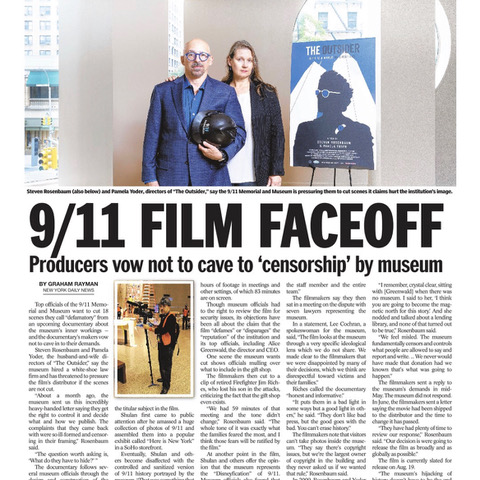Listen HERE
I will be publishing a full transcript of this interview for subscribers to my Substack page.
Steven Rosenbaum and Pamela Yoder are the filmmakers behind The Outsider, scheduled for release August 19th—assuming the 9/11 Museum’s team of lawyers hired to torpedo the film do not succeed. As the New York Daily News reports: “Top officials of the 9/11 Memorial and Museum want to cut 18 scenes they call ‘defamatory’ from an upcoming documentary about the museum’s inner workings — and the documentary’s makers vow not to cave in to their demands.”
The Outsider, unlike the 9/11 Museum, does not leave the 9/11 truth movement on the proverbial cutting room floor. But more important than the smattering of explicit scenes featuring 9/11 truth protestors is the film’s overarching thesis: The 9/11 Museum failed in its original mission, as understood by Michael Shulin, to promote an open conversation about 9/11 stressing “question marks rather than periods.” The main villain seems to be 9/11 Museum Director Alice Greenwald, former director of the Holocaust Museum, who apparently insisted on making the 9/11 Museum into a “shrine of the monstrous lie.” Philip Kennicot of the Washington Post describes the Museum as “obsessive about repeatedly putting visitors through the trauma of 9/11…it is articulating a new kind of religion, an American religion based on a sense of grievance and loss, a nation that would be reborn as a more militaristic, aggressive superpower.”
The story behind the film may be of interest to 9/11 researchers. Rosenbaum and Yoder amassed the world’s biggest collection of non-network-TV videos taken on 9/11 and donated them to the incipient 9/11 Museum through then-Creative Director Michael Shulin. (Shulin, for his part, had collected the world’s biggest set of 9/11 photographs for his storefront exhibit, which led to his being offered the Creative Director position.)
Rosenbaum, Yoder, and Shulin donated their 9/11 videos and photos to the Museum on the understanding that they would be part of an open-to-the-public research library. It didn’t quite turn out that way:
Steven Rosenbaum: “If you go down to the museum and say, ‘I’m a researcher and I’d like to come in and use this material, they will send you a contract. And that contract you will have to sign. And in that contract, it will say that anything you create has to be reviewed by them and can be modified by them and can’t be released to the public unless they approve it.”
Kevin Barrett: “It sounds like what the CIA does with agents who want to write books.”
Steven Rosenbaum: “Here’s what’s puzzling about it. There is no example of any other museum in the United States that we’ve been able to find that controls legitimate, bona fide access to their archives in that way. And that includes, by the way, the Holocaust Museum. And we checked on this. And the Holocaust Museum said to us quite clearly, ‘if you arrive and say we’re making a book about the Holocaust and I don’t believe it happened, I’m a denier, and I want to access your materials to prove my point,’ they will let you in. They won’t ask to review what you write. They won’t try and edit it. And that’s kind of at the basis what museum making is supposed to be about: investigating archives. I can’t explain to you why they (the 9/11 Museum) don’t allow that.”
Kevin Barrett: “Well, I could I offer a couple of guesses, but I’m sure you’ve already thought of them, such as the likelihood that there is some very damning material in those archives that would add to the kind of cumulative case made by the many, many dozens of scholars who have published peer reviewed articles supporting the thesis of the 9/11 truth movement that this was a false flag event.”
What does Steven Rosenbaum think about 9/11 truth issues in general, and Building 7 in particular? Listen and find out.
